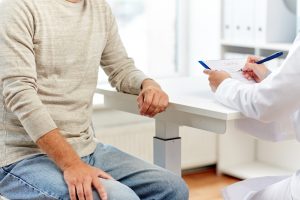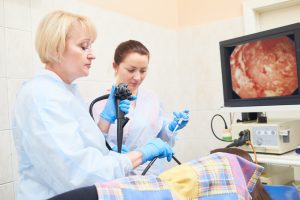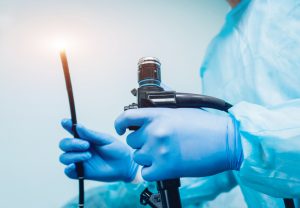What is a Colonoscopy Procedure?
A colonoscopy is a visual examination of the complete bowel, also referred to as the colon. This examination, doctors conduct to explore possible causes of abdominal pain, rectal bleeding, chronic constipation, chronic diarrhea and different intestinal issues. A colonoscopy is something they use additionally as a technique of screening for colon cancer.
The doctor uses a flexible tube, referred to as an endoscope, with a light that features a tiny video camera on the tip, which allows the gastroenterologist to internally inspect the entirety of the colon. GI doctors can even sample tissue and/or take away polyps within the colon during the procedure.
Adults over age fifty are recommended to schedule regular colonoscopies. African American adults have a slightly higher risk, and are advised to begin screening at age forty-five. At-risk adults should schedule regular colonoscopies at 10-year intervals after their first screening to prevent colon cancer. Patients who have a hereditary history of colon cancer, inflammatory diseases like inflammatory bowel disorder (IBD), or alternative risk factors for colon cancer should also screen earlier or increasing frequency.
Where to Get a Colonoscopy in North Texas?
You can schedule a colonoscopy at the Digestive Health Center where our board-certified gastroenterologists specialize in this procedure. Trust Digestive Health Centers to provide top-notch care from leading gastroenterologists to improve your digestive well-being. We have six locations in North Texas so that you can find a center near you now.
Before Your Colonoscopy Procedure
 Your gastroenterologist will contact you a few days before your procedure to answer any questions as well as concerns that you may have about your colonoscopy. Most likely, your GI physician will inquire about any special medical conditions you may currently have.
Your gastroenterologist will contact you a few days before your procedure to answer any questions as well as concerns that you may have about your colonoscopy. Most likely, your GI physician will inquire about any special medical conditions you may currently have.
Some Common Questions Your Gastroenterologist Will Ask Are:
- Do you have any special medical conditions such as heart or lung conditions?
- Are you allergic to any medications?
- Are you currently pregnant?
- Do you have Diabetes?
- Do you take medication that affects blood clotting?
How to Prepare for Your Colonoscopy at Digestive Health Centers
Your gastroenterologist will also give you instructions for your colonoscopy prep. Prior to the exam, it is important that the colon is thoroughly cleansed. This allows the GI physician a clear view of the colon, therefore a more detailed examination.
Colonoscopy Prep Diet
Colonoscopy prep varies based on the physician. However, most GI physicians require that you refrain from eating solid foods as well as dark liquids. Clear liquids are normally approved, such as water and light broths. Some gastroenterologists also prescribe a laxative.
Find Transportation for After Your Procedure
You will need to arrange transportation before the appointment. Do not plan on using a driving service. You will need someone you trust, that has a valid driver’s license, to usher you from the recovery room all the way home.
It is also recommended that you stay home and limit traveling during your cleanse. You will make frequent trips to the bathroom during this time.
What to Wear to Your Colonoscopy Procedure
Most gastroenterologists recommend wearing loose and comfortable clothing to your colonoscopy procedure. Before your procedure begins, you will be asked to change into a gown provided by the colonoscopy and endoscopy center.
During Your Procedure
 It is recommended to arrive thirty minutes before your scheduled appointment. This time allows you to take care of any paperwork as well as give you time to talk to your gastroenterologist about any questions or concerns you have.
It is recommended to arrive thirty minutes before your scheduled appointment. This time allows you to take care of any paperwork as well as give you time to talk to your gastroenterologist about any questions or concerns you have.
Are You Put to Sleep for a Colonoscopy?
When it is time to begin the colonoscopy, the GI physician will then most likely give you some form of sedation. Sedation will be administered either in pill form or through an IV. You will relax on the exam table as the sedation sets in.
Your gastroenterologist will ask you to lie on your side with your knees bent toward your chest for the procedure.
What Happens During a Colonoscopy?
 Once you’re sedated, the gastroenterologist will insert an endoscope into your rectum. An endoscopy is a thin tube-like instrument with a light and a camera on the end. The gastroenterologist will gently glide the endoscope through the colon, carefully inspecting the lining for polyps. Polyps are noncancerous clumps of cells that have the potential to become cancerous. If polyps are found, they may be biopsied (removed) during the procedure.
Once you’re sedated, the gastroenterologist will insert an endoscope into your rectum. An endoscopy is a thin tube-like instrument with a light and a camera on the end. The gastroenterologist will gently glide the endoscope through the colon, carefully inspecting the lining for polyps. Polyps are noncancerous clumps of cells that have the potential to become cancerous. If polyps are found, they may be biopsied (removed) during the procedure.
How Long Does a Colonoscopy Last?
A colonoscopy procedure usually lasts 20 minutes to an hour.
After Your Colonoscopy
After your colonoscopy, you will relax in recovery for about an hour until the sedation wears off. Your ride will arrive and escort you home safely. You will not be able to safely drive yourself home, as effects of the sedation may linger for an entire day afterwards.
Colonoscopy Side Effects
Post-procedure side effects include bloating and gassiness. Walking typically helps alleviate this discomfort. It is also normal to have a small amount of blood in your stool after your first post-colonoscopy bowel movement. If this persists, consult with your gastroenterologist.
The Results
Possible findings include diverticulitis and polyps. If polyps are found, they will remove them during the colonoscopy and send them to a pathologist.
Polyps are common, and usually, they describe them as benign or cancerous. While the overwhelming majority of polyps are benign, your gastroenterologist will still send the polyps to a lab for testing, as early colon cancer detection is crucial. As soon as your lab results are ready, your gastroenterologist will contact you to schedule a time to review and discuss the results with you.
For more information or to schedule an appointment at the Digestive Health Centers in North Texas, call 214-646-3459 now.
